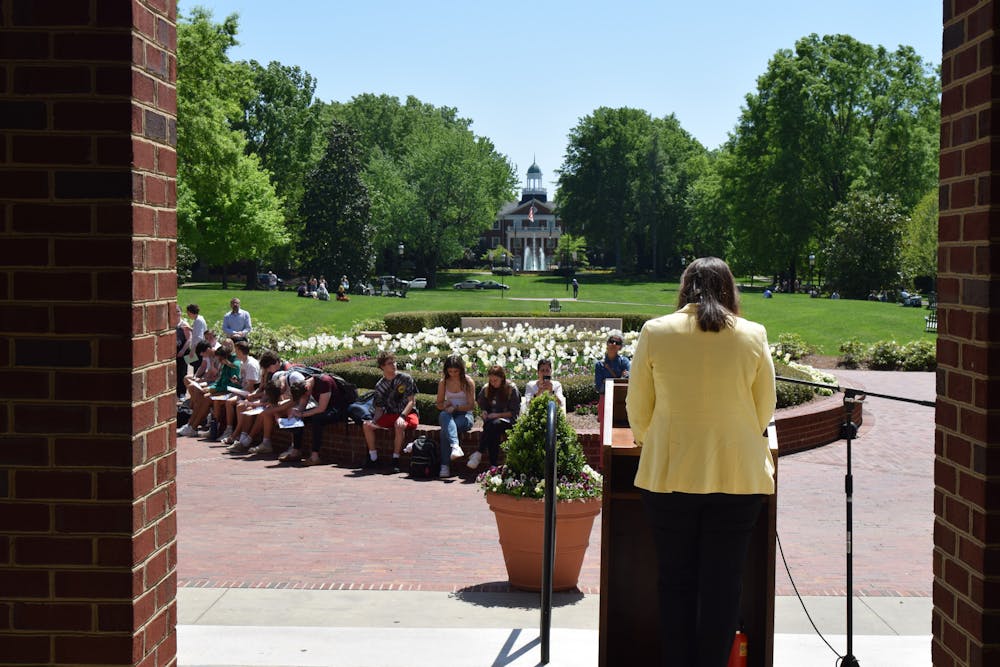Over 27 volunteers will stand at the front steps of Moseley Student Center from 10:30 a.m. to 3 p.m. to read the names of those who perished during the Holocaust.
Organized by Hillel, Jewish Life, Jewish Studies and the Truitt Center for Religious and Spiritual Life, Elon carried its two decade tradition of honoring Holocaust Remembrance Day. Each year, the volunteers only read just a fraction of the names, honoring the lives lost.
Interim Assistant Director of Jewish Life Christy Brooks said this has been an Elon tradition for almost two decades, but it has always been a Jewish tradition.
“The Jewish people actually do this regularly for people that they've lost in their lives, in what's called a yahrzeit,” Brooks said. “It is part of our tradition and our culture to use the telling of the names as a way to remember the past and to keep their memories in our hearts and in our minds.”
Brooks stressed the importance of understanding the atrocities of the past and the hatred of the present in order to remember and address the problem. Outside of Holocaust Remembrance Day, Brooks pointed to a student-run antisemitism training as other means of educating the community.
According to Brooks, over 3,000 names were read in total throughout the day.
“There are a lot of people who don't know what the Holocaust is or they don't understand it. There's Holocaust denial and distortion is definitely a big problem, not only nationally, but internationally,” Brooks said. “ This is a way to provide information, give people an opportunity to commemorate and be a part of this and also to be a witness and to keep this tradition going.”
According to Jewish Life Program Coordinator Jay Rimmer, speakers switched off reading names in 10-minute intervals. An estimated 10 to 17 million people were systematically killed in total between 1941 and 1945.
“If you don't know their name, just remember the victims of this atrocity and pay attention, because this stuff keeps happening throughout history, and to all sorts of groups,” Rimmer said. “Those who don't remember history are doomed to repeat it. … We’re trying to break down that barrier of ‘other.’”
Elon University President Connie Book is scheduled to read names at 2 p.m., as well as Chaplain Emeritus Richard McBride at 2:20 p.m.
According to Rimmer, the reading of the names can and should have a unique impact on everybody, while also educating and informing the community.
“It's just a remembrance, and it can be a personal moment, but it's also meant to remind everyone, including Jews and non-Jews, what can happen,” Rimmer said. “There was plenty of other people and groups who were victims of the Nazis.”
Freshman Diego Hernandez sat in Young Commons to listen to the names at the start of the event. According to Hernandez, he first heard about the Reading of Names through Elon’s cultural calendar and planned to attend the event weeks in advance.
“It's very honorable to at least go and listen to the names of those people that died,” Hernandez said. “You might not know them at all, but there were people that were just like each of us. It could have been anyone. I think it's really important to always remember those people that died.”

Hernandez also stopped by the Hillel table, set up on the steps of Moseley Student Center, to learn and look through the various educational materials on display — including ribbons that represent each of the minority groups targeted during the Holocaust.
“There were some ribbons that were targeted for Jewish people, for LGBTQ, for people of color, and so you might not realize so many people that were targeted,” Hernandez said. “It was really nice being able to get one of those … out of respect for how they died.”
Director of Jewish Life Betsy Polk encouraged anyone who passes by to stop and listen to reading of the names, as well as visit the Hillel table to learn and ask questions.
Polk also said she hopes the Reading of the Names provides a sense of community support and acknowledgement of traditionally targeted minority groups.“

Director of Jewish Life Betsy Polk watches from behind a Holocaust education table as Elon University President Connie Book reads the names of those who were targeted and murdered during the Holocaust. Book spoke as a volunteer for Elon's Reading of the Names event — organized by Hillel at Elon, Jewish Life and the Truitt Center for Religious and Spiritual Life — in commemoration of Holocaust Remembrance Day on April 18.
"To have a connection in your school, in your place, in your community — not just the Elon community but the community at large — sends a powerful message that this is a community that is here for you,” Polk said.
As a student and a member of the community, Hernandez said he feels like the acknowledgement and remembering of the past is the only way to move forward together.
“It's important to always remember because we can't move forward without looking back and learning from our mistakes, learning and seeing how people can act,” Hernandez said. “We should always love one another, and if we take the time to at least listen to stories like these, or read stories like these or listen to names like these, I think that's just going to help us move forward one step at a time.”


